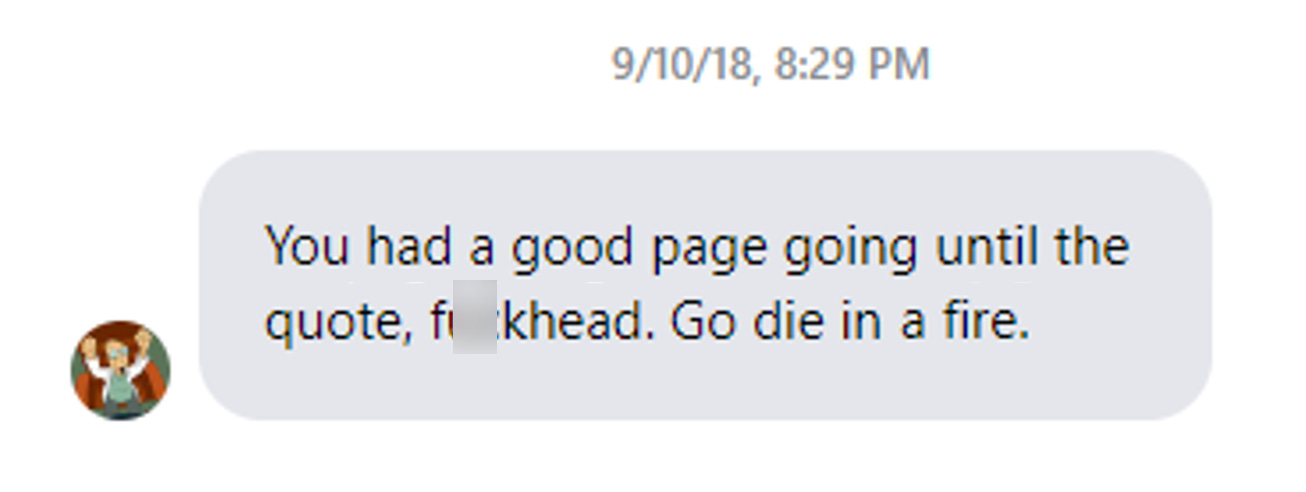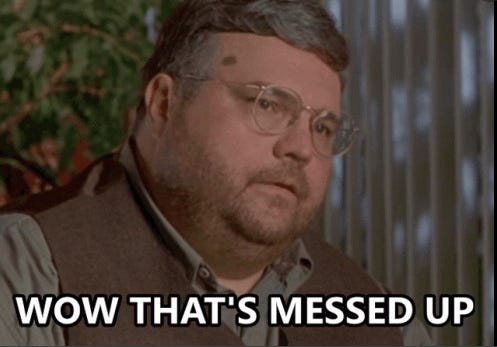📘 My anxiety is scheduled on the 12s
Creating content + craving validation + social media = anxiety
When we started The Dad and scheduled our first posts, we scheduled them on the 12s: 9:12am, 10:12am, and so forth. The thought was that a lot of big publishers would schedule content on the hour, so if we were competing against the almighty algorithm, it’d be helpful to pick a slightly different time. (ATTENTION social media professionals: I seriously doubt it matters at all. But it doesn’t hurt.)
Go ahead, check The Dad’s Facebook posts, still on the 12s.
I haven’t worked for The Dad in nearly 6 months and I still catch myself looking at the time, and if it’s just after a 12, I feel an urge to head to social to see how the latest post is performing. I don’t think that will ever go away.
Just a little social media PTSD.
(Yes I went out of my way to publish this post on a 12.)
My first therapist’s name was Karen. I asked Karen if she was on social media. She was not. AT ALL. Oh…
I asked her if she had heard of Scary Mommy or The Dad. She had not.
“Okay I only ask because while I have been a nervous person my whole life, I think lately, a lot of my anxiety stems from working in social media.”
Yes, studies who that social media can be harmful for mental health.
"Yeah yeah yeah for people who are on there scrolling and occasionally posting, for sure. But I think it’s even worse for people who work in social media.”
How so?
"While we’ve been talking, there have been thousands of interactions and hundreds of new comments on The Dad’s content. Some of them very nice saying how much they love it, or engaging in a positive community, but most of them angry or hateful.”
I’m sure that’s difficult for anyone.
“Yeah but I honestly think my team and I have hardened ourselves to it more than the general public. We have mental callouses for those things. So the one offs don’t affect us too much. I’ve had people tell me to die in a fire, for example.”
Wow. What do you say to that?
“Nothing. You say nothing. Just let it go. They want a response. Don’t give it to them.”
So if you’re calloused to this, why does it cause so much anxiety?
“I think there’s a couple things goin on. If you’re a creative person who craves validation, it’s dangerous to have a large audience on social. You’re able to create content and put it in front of a limitless amount of people all of the time. It’s like if you’re a standup comedian and you perform standup all of the time, for potentially everyone. And the audience is constantly shouting ‘Yeah that was good! I like that!’ or ‘I hope you die in a fire f*ckhead!’
…It’s not like the negative feedback is necessarily worse than the positive. Getting any kind of feedback at that volume is exhausting. You spend a lot of time and creative energy making something, then you post it, and you get INSTANT feedback. You don’t even know it’s happening but your brain is taking it all in. ‘Ohhhh that was good.’ and simultaneously ‘Oh no that was bad. What am I even doing?’ And you crave MORE.
…I’m also very data driven and goal oriented. So it’s not just the interactions on specific posts; it’s the monthly analytics reviews where we track growth and engagement. It’s the need to prove ourselves as a new brand. It’s a need to hit certain numbers so we can make the case to be properly staffed. There’s a certain amount of self worth tied up with the success of the brand.
…After a post goes up, we track the engagement. If it doesn’t get 1,000 likes in 10 minutes on Instagram, and it’s not a post we believe in for brand mission reasons, we will delete it. Sometimes I’ll spend hours on a stupid meme or video. We’ll post it. Once the 12 hits, I’m on IG refreshing and checking numbers. I can usually tell within 30-40 seconds if it’s gonna be a hit or a bomb. If it’s not lookin good, I wonder if it’s too wordy, too polished, not polished enough. Maybe there was a funnier word I could’ve used there. Is the caption stupid? And then just like that, it can be deleted forever and replaced. Then we watch the numbers on the replacement.
…it’s so easy to blame the algorithm. Oh that was good work but didn’t perform because it wasn’t a reel or it was 16x9 instead of square, or blah blah blah. But the internet is nothing if not candid. If it’s good, they’ll tell you. And if it’s bad, they’ll shout it at you.”
Oh my.
“Yeah. But it’s also such a stupid thing to complain about. Because I also love it. Creating content is the greatest. But if you’re a creative person who craves validation and you’re given access to limitless validation it’s like giving drugs to a drug addict.”
Right... So have you ever tried yoga?
If you don’t work in social media, all of that sounds batshit crazy. And maybe it is. But I know The Dad team relates. Maybe it was just us? But that level of passion for the content and the audience is probably what made The Dad successful. Also made many of us burn out.
Shout out to everyone who was in those anxiety filled 12s trenches, especially: Ally Probst, Morgan Music, Jordan Stratton, Jimmy Applegath, Jared Warner, Mark Chalifoux, Mike Julianelle, Ted Pekula, Yael Meshulam, and so many more.
Super necessary footnote: social media gets a bad rap. You can’t post a hot take on something without it being firmly on one side or the other, and just about everyone chooses to write about how bad social media is. It definitely has negative aspects, as described above. But I gotta tell ya, it’s also quite wonderful in many many other ways. The Dad team would often say that our most ambitious goal was to attempt to restore social media to its original benevolent intentions of building community and bringing people together. Unachievable? Probably, but even if we did it a little bit, that’s impactful.
So now that we’ve covered the damage social media did on my anxiety levels, let’s get into The Dad’s goals and what it was like in the earliest days. Because it was hella fun and exciting.
11/1/2017 is coming.




Remember when Memes intended to be funny would almost start WW3? The Kanye one comes to mind. The Kobe and George Floyd article coverage we did, whoa. And the Obama interview required a full scale moderation army.